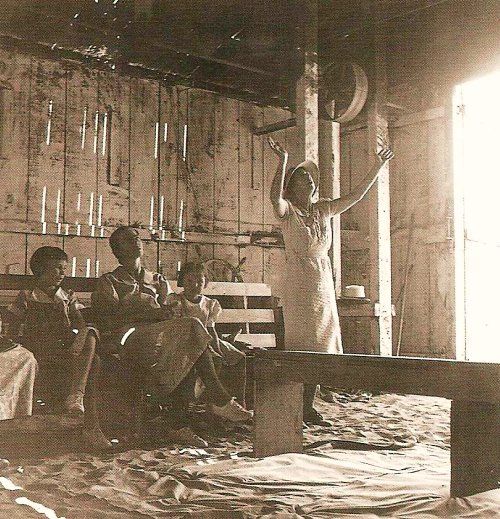The New Pentecostals
As a pastor, I am asked on a somewhat regular basis what tradition our church falls under – to which I normally answer, “We are a non-denominational Christian Church.” If people want more of a description, I generally tell them we are both Evangelical and Pentecostal. Though I believe the church is a movement more than it is an organization, definitions often help us to have a starting point. So what does it mean to be Evangelical? How about Pentecostal? And what is a New Pentecostal?
Evangelical
Let’s start with Evangelical. The National Association of Evangelicals defines it this way,
The term “evangelical” comes from the Greek word euangelion, meaning “the good news” or the “gospel.” Thus, the evangelical faith focuses on the “good news” of salvation brought to sinners by Jesus Christ. Evangelicals are a vibrant and diverse group, including believers found in many churches, denominations and nations. Our community brings together Reformed, Holiness, Anabaptist, Pentecostal, Charismatic and other traditions. [i]
If you want to read further, historian David Bebbington identifies four primary characteristics of evangelicalism.
Can you be both Evangelical and Pentecostal?
Click To Tweet
Pentecostal
Today Pentecostals make up 600 million believers worldwide. That’s nearly a fourth of all Christendom! [ii] Ed Stetzer gives some interesting sociological reasons for the dramatic rise of Pentecostalism in his article, Why Do These Pentecostals Keep Growing? But what does it really mean to be Pentecostal? Many say it’s those who have an emphasis on the baptism in the Holy Spirit as evidenced by speaking in tongues, but I define it a little more broadly, as those who believe and practice all the spiritual gifts (found in Romans 12 and 1 Corinthians 12 and 14), including tongues, prophecy, healing, miracles, and faith.
The term Pentecostal originally comes from what believers experienced in Acts 2 on the day of Pentecost,
On the day of Pentecost* all the believers were meeting together in one place. 2 Suddenly, there was a sound from heaven like the roaring of a mighty windstorm, and it filled the house where they were sitting. 3 Then, what looked like flames or tongues of fire appeared and settled on each of them. 4 And everyone present was filled with the Holy Spirit and began speaking in other languages,* as the Holy Spirit gave them this ability. (Acts 2:1-4 NLT)
I encourage you to read up on it further. It is a fascinating history. A good place to start is the Azusa Street Revival .
Pentecostals make up 600 million (25%) believers worldwide!
Click To Tweet
A Broader View
I previously thought that speaking in tongues was the only evidence of being baptized in the Holy Spirit, now I believe it’s just one of the evidences. The greater evidence is the fruit of the Spirit found in Galatians 5; you know – love, joy, peace, patience, kindness, goodness, faithfulness, gentleness, self-control? In my mind, the fruit of the Spirit is much stronger evidence that someone is filled with the Spirit than tongues alone. Why do I say that? Because we’ve all met someone that is supposedly “Spirit filled” and speaks in tongues but lives like the devil. If there is one thing I’ve learned it’s that spiritual gifts aren’t necessarily a sign of spiritual maturity! Take the Corinthians. They were practicing many of the spiritual gifts but Paul had to rebuke them for being carnal, fleshly or unspiritual (see 1 Corinthians 3).
How I Became a Pentecostal
Just out of college, I was newly saved and hungry for God when I began attending a non-denominational charismatic church in Olean, NY. That’s when I first heard about the baptism in the Holy Spirit. For me it was simple – I saw it in the Bible, it seemed to help those who received it, and it was available to all! You can check out this teaching if you want to hear more. Why wouldn’t I want it? After hearing it preached, I went forward to receive prayer for the baptism. It was a powerful experience and I knew I had received something. It wasn’t until a month later that I spoke in other tongues. It came like a flood and when it did, I prayed in tongues for hours in my bed and was filled to overflowing with the presence of God. Immediately, my walk with God began to dramatically change. One week later, I was sitting in a bar watching my friends out on the dance floor. Up until then, I didn’t exactly have the purest of motives in going to the bar but something had changed. As I sat there, alone, staring out at the dance floor I felt a deep pit in my stomach and said to myself, what am I doing here? I don’t belong here! I left that night and didn’t go back. My walk with God went to another level. I began to grow and flourish, and spiritual gifts like tongues and interpretation and prophecy began to bubble up. The baptism in the Holy Spirit changed everything for me. I was on fire for God, and since then it has largely remained that way.
Who Are the New Pentecostals?
There is a new breed of Pentecostals. I call them the New Pentecostals. The New Pentecostals want more than just the baptism in the Holy Spirit as evidenced by speaking in tongues. Yes, we want that too, but there is more to being Pentecostal than speaking in tongues. I’m tired of the old stereotypes: holy rollers, fanatics, emotionalistic, swinging from the chandeliers, valuing experience over the word of God. Often, when movements begin or at different times during the course of a movement, the pendulum swings wide and goes to extremes. I think this has been the case with the Pentecostal/Charismatic movement at times. The New Pentecostals welcome encounters with God, but only in submission to the word of God. After all, the word of God should be a springboard into encounters with the risen Christ. As the late A.W. Tozer said,
If Christian preaching does not produce spiritual experience and maturing in the believer, the preaching is not being faithful to the Christ revealed in the Scriptures! [iii]
The word of God should be a springboard into an encounter with God.
Click To Tweet
Marks of the New Pentecostals
1) We want all the power of God without being hokey. Not that we want to take out the mystery of the spiritual gifts or make Christianity bland, but we also don’t want to be unnecessarily weird. First and foremost we are to be a witness for Christ. Apart from a sovereign move of God, if what we are doing scares would be followers of Christ then there is a problem! Paul shares on this extensively in 1 Corinthians 14. At the end of the chapter, here is what he says, “So, my brothers, earnestly desire to prophesy, and do not forbid speaking in tongues. 40 But all things should be done decently and in order” (1 Corinthians 14:39-40 ESV). In other words, use the gifts but do them the right way!
One of the ways we our church does this is to give an explanation following a supernatural demonstration or gift – not to explain it away but rather to help people who may not have any experience with spiritual gifts. We also regularly share prophetic words without being overt about it. In other words, instead of a speech in Elizabethan English starting with, “Thus sayeth the Lord,” we just say it clearly and directly.
2) We don’t want to be pushy or elitist with the gifts. The fruit of the spirit trumps the gifts of the spirit. Without love the gifts become a clanging cymbal. Again, the Corinthians gave us a great example of what not to do. When I was a young believer, I was very zealous (sometimes to a fault). I remember one time, while I was visiting my sister at college; I asked one of her Christian friends if I could pray over her to receive the baptism in the Holy Spirit. I prayed so loudly over her in tongues I scared the poor girl half to death! It didn’t make her want the baptism in the Holy Spirit. It scared her away!
How can we avoid elitism? Teach on the gifts and give people an on ramp to experience them but don’t be pushy or make it a pre-requisite for being spiritual. We’ve had people on our core team of leaders that don’t speak in tongues but regularly received visions and prophetic insight that significantly shaped or changed our course at times. They were not (by the standard definition) “baptized in the Holy Spirit with the evidence of speaking in tongues” but that didn’t hinder God from giving them other gifts.
3) We want compassion and social change to be a hallmark of ministry. One of the most important developments in the modern day Pentecostal movement is the change in direction toward compassion and social change as noted in this article from Christianity Today called A New Kind of Pentecostal.
In the article, Billy Wilson, executive director of the International Center for Spiritual Renewal, an alliance of Pentecostal and charismatic leaders, says, “In my opinion, this generation has the strongest horizontal desire to change the world of any other one in history.”
4) Above all, New Pentecostals want people to come to the saving knowledge of Jesus Christ and become mature disciples. Helping people find and grow in Christ should be of utmost importance to every Christian. If our gifts hinder rather than help that mission – we are in error!
Spiritual Gifts are for the Churched AND the Unchurched
I believe with all my heart that spiritual gifts, done right, are not only for the churched but the unchurched. I leave you with these words from Paul the apostle,
But if all prophesy, and an unbeliever or outsider enters, he is convicted by all, he is called to account by all, 25 the secrets of his heart are disclosed, and so, falling on his face, he will worship God and declare that God is really among you. (1 Corinthians 14:24-25 ESV)
Spiritual Gifts are for the Churched AND Unchurched
Click To Tweet
I would love to hear from both Pentecostals and other traditions as well!
Other Helpful Resources
Rest Assured: Seven Days to Stillness, Sanity and the Sabbath You Need
 True rest is something that we all desperately need but can’t seem to find. It’s not just sleep and down time we need, although that is important, but rest for our souls. In the words of the early church father, Augustine of Hippo, “You have made us for yourself, O Lord, and our heart is restless until it rests in you.”
True rest is something that we all desperately need but can’t seem to find. It’s not just sleep and down time we need, although that is important, but rest for our souls. In the words of the early church father, Augustine of Hippo, “You have made us for yourself, O Lord, and our heart is restless until it rests in you.”
True rest can only be found in a relationship with God.
*This e-book and downloadable PDF is available for pre-order now! Launching 5-15-19.
*Image credit to J.D. King via Flickr
[iii] Adapted from Chapter 1 of the book Men Who Met God, published by Christian Publications, Inc.) http://www.thegloryofgodoncapecod.com/articles/edifying-relevant-articles/the-necessity-for-encounter-with-god,-by-awtozer.html
Share this Post:












